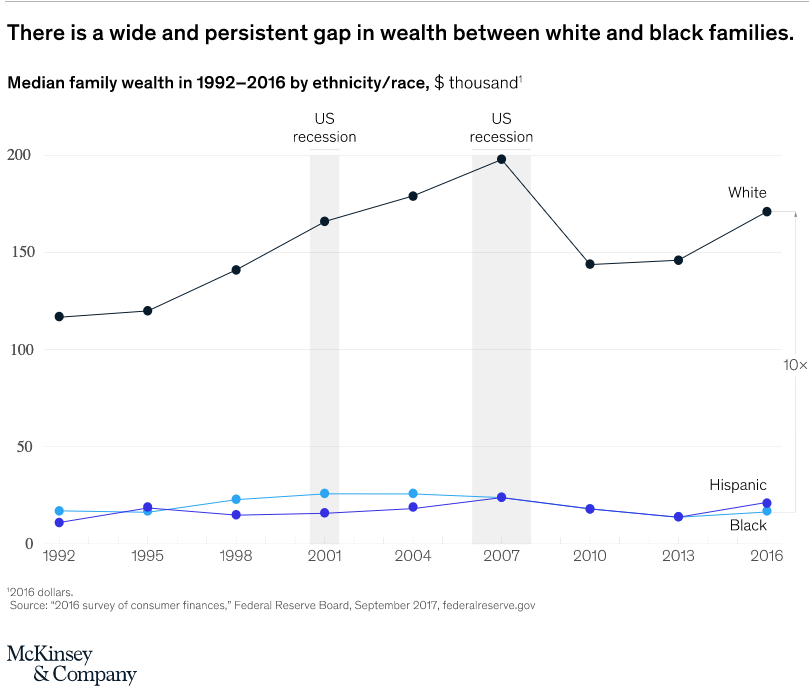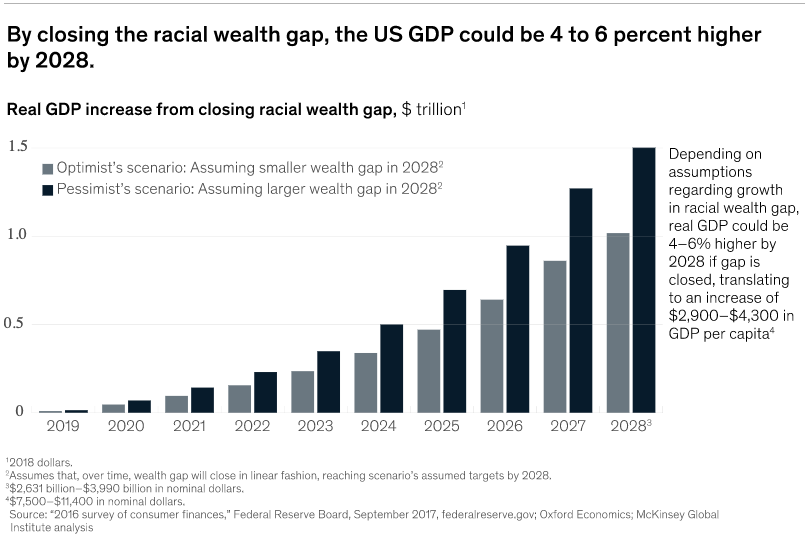Closing racial wealth gap could boost US GDP by 6%
A new study from McKinsey & Company shows that U.S. GDP could be up to 6% higher in the next eight years if the racial wealth gap is closed. In other words, the widening gap between white and black households will cost the U.S. economy between $1 trillion and $1.5 trillion between 2019 and 2028, according to the report.
The study highlights that the racial wealth gap between black and white families grew from $100,000 in 1992 to $154,000 in 2016. “In part,” the report states, “because white families gained significantly more wealth (with the median increasing by $54,000), while median wealth for black families did not grow at all in real terms over that period.”
“Despite the progress black families have made in civic and economic life since the passage of the Civil Rights Act of 1964,” the report notes, “they face systemic and cumulative barriers on the road to wealth building,” including discrimination and poverty.
Harming the economy
Though the report says that the gap has “obvious” disadvantages to the black community, it’s clear that the racial wealth gap harms the American economy as a whole. Using the Oxford model for forecasting, the study tracked the impact on GDP of closing the racial wealth gap between 2019 and 2028.

In what they call the “optimist’s scenario”, the study assumes that white and black wealth grows at the same rates they did from 1989-2016.
“Assuming that black wealth grows at a rate of 3%, while white wealth grows at a rate of 0.8% continuously over the next 10 years, the wealth gap would still be large at 7.7 times — but would narrow. “Closing that gap in this scenario,” McKinsey says, “would add $1 trillion to the 2028 economy.”
But under what the study dubs the “pessimist’s scenario,” the racial wealth gap would only widen. Under this model, white wealth grows at the same average rate it did from 1992 to 2007 (3.4%), while black wealth declines at a rate of 3.4% — the same rate it did from 2004 to 2016. With these growth and reduction rates, the gap would increase to as much as 23 times. Closing the racial wealth gap in this scenario would add $1.5 trillion to the economy.

Tackling racial inequality
While there are clear economic benefits to closing the racial wealth gap, it’s still unclear exactly how to accomplish that.
Presidential candidate Sen. Cory Booker (D., NJ) and Rep. Ayanna Pressley (D., MA) have proposed a “baby bonds” bill that would aim to give poor children up to $50,000 to start adulthood. The proposed legislation is race-blind, but is designed to impact children of color, who disproportionately live in poverty compared to their white counterparts.
Presidential candidates Sen. Elizabeth Warren (D., MA) and Bernie Sanders (I., VT) have also proposed eliminating student loan bills, which they say will help poor students struggling under the burden of sky-high school debt.
Other politicians have pointed to reparations as a way to boost black communities that have been economically disadvantaged in the country since the beginning of chattel slavery in the United States.
But even without clear proposals to specifically tackle the widening gap between white and black families, the study makes clear it would be advantageous to do so.
“With the right targets in sight and a framework from which to address the challenge comprehensively,” the report notes, “we can begin to identify the initiatives and policies that are most likely to give black families a boost. The country has over a trillion dollars to gain from the effort.”
Kristin Myers is a reporter at Yahoo Finance. Follow her on Twitter.
Read more:
Follow Yahoo Finance on Twitter, Facebook, Instagram, Flipboard, LinkedIn, YouTube, and reddit.
Read the latest financial and business news from Yahoo Finance

